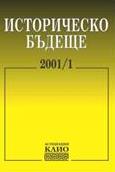Политическите документи: между културната политика на българската държава и грижата за обществения ред
Political Documents: Between the Cultural Policy of the Bulgarian State and Care for the Public Order
Author(s): Anna KochankovaSubject(s): History
Published by: Асоциация Клио
Keywords: cultural policy; Bulgarian state; public order; Soviet type; archives
Summary/Abstract: The present study is an attempt at tracing the ways of making political documents a component part of the archival resources of the Bulgarian state up to 1951 when the Soviet type centralized model of organizing archives was introduced. Those documents got into the big archival collections formed as a result of the cultural policy of the Bulgarian state or were placed in the archival funds of state institutions that exercised legal functions and political control. Their fate was marked by the political regimes. The perception of the historical value of the political documents as a function of generally accepted views on history and contemporaneity and the distance of time that separated them in the public mind proved to be quite important. Documenting the activities of the Bulgarian political parties is perceived by the author as a consequence of the organizational and power-related dealings and motives getting more complicated and as adoption of administrative practices, conduct and communication in the public sphere as well. The perception of archive-building was connected with the new public culture that was gaining recognition in Bulgarian society. Research shows that the private documents of politicians, statesmen and public figures were brought to the archives most intensively, usually as donations, in the period between the two World Wars. The distance of time and the accumulation of history as well as the typical political rationalization of state-building were of great importance to the work of the archival departments of the cultural institutions. The amassment of political documents in the archival funds of the Ministry of the Interior and Public Health in the period under discussion is viewed as the result of the development of its control functions and organizational structure. It is shown that police practice in Bulgaria was not unique and that political documents got to the present day in a similar way in other countries with rich experience in democracy.
Journal: Историческо бъдеще
- Issue Year: 2001
- Issue No: 1
- Page Range: 165-183
- Page Count: 19
- Language: Bulgarian
- Content File-PDF

